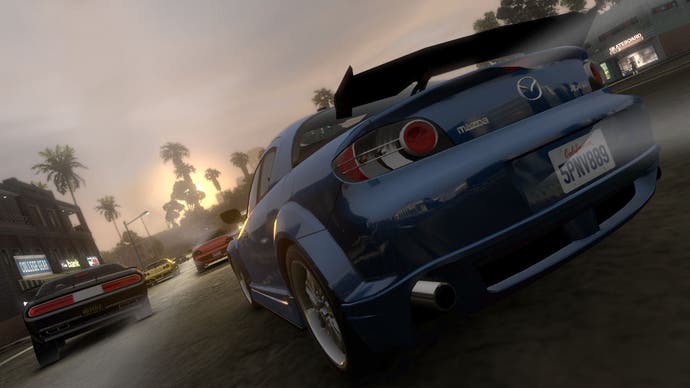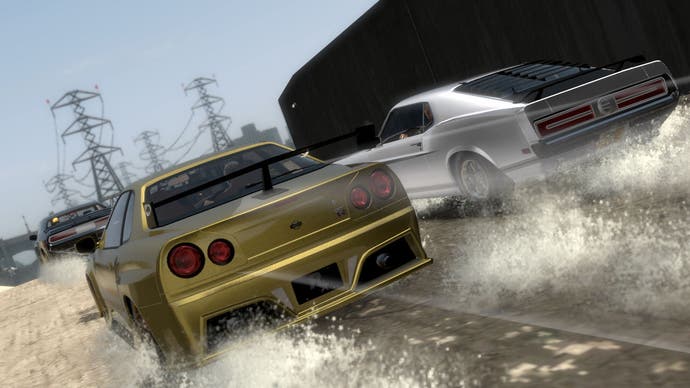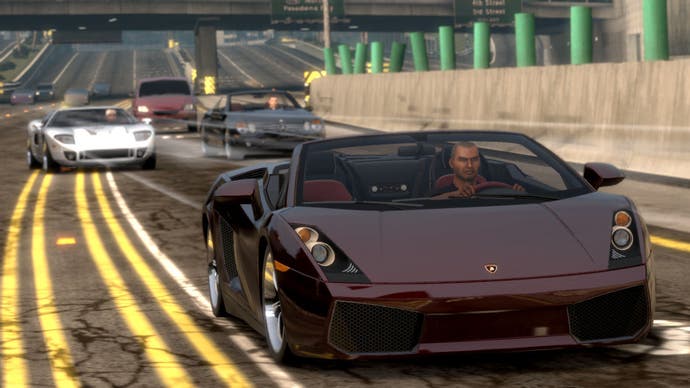Midnight Club: Los Angeles
If you like a lot of customisation on your biscuit, join our club.
Walking into one of Rockstar's demo rooms is always a slightly unnerving experience. It's not that you wonder if the M-16 lampshade holder is fully functioning (although you do), but rather the feeling that you've been zapped by a shrink-ray. The gigantic 60-inch HDTV and huge leather sofa give the impression that you're in the Big Friendly Giant's games room.
Anyway, no doubt Rockstar likes to keep its captives on edge from the start, but the most startling thing to happen during this preview was right at the beginning: with the revelation that Midnight Club is in fact Rockstar's second best-selling series, after you-know-what.
The proffering of this information was followed by a well-practised pause as a moment is given for a spluttered "gosh!" of surprise. When it's revealed an instant latter that the three games thus far have sold 15 million copies worldwide you begin to wish for a cup of tea to spit across the coffee table in surprise. "Everyone's surprised when we tell them that," says the Rockstar rep guiding us who, fortunately for the coffee table, hasn't brought the tea yet.
The reasons for the surprise are fairly obvious, for although Midnight Club is all about the devilishly illegal business of late-night street-racing, the series is relatively safe and unthreatening. It's also uncomplicated - you race, you customise your car, you race again. Midnight Club: Los Angeles, as the title suggests, has abandoned the multiple cities of previous versions in favour of every games journalist's favourite E3 hellhole.

Those of you who have had the dubious privilege of visiting the real LA will know that it's not so much a proper city as a collection of unrelated towns connected by an unending series of motorways (or whatever they call them over there). This disparity of character is precisely why Rockstar has chosen it: the real LA has enough variety within its city limits - from the beaches of Santa Monica to the hills of Hollywood - to avoid having to teleport around the world in search of similar diversity, Rockstar points out.
And it works great too, with a giant 3D map that suddenly zooms in to tarmac level once you deselect it. Once on the ground things aren't quite as jaw-dropping, but being able to drive anywhere in a (relatively) realistically modelled LA with no load times and plenty of traffic going about its business is appreciably impressive - and a satisfying foil for free-roam racing. The noticeably short draw distance for the taller buildings and the sub-60 frame-rate is a little disappointing, but it's saved to some degree by a proper day/night cycle, which means that for 50 percent of the game blue skies are back and there's no need to pretend you're a vampire street racer.

The Midnight Club games have never particularly been about technical accomplishment, though, and in this sequel most of the innovation is concentrated in the structure. You drive around LA flashing your lights at people who the thrice-handy map indicates might want to race you. The type of race varies enormously, from basic ordered checkpoint races to unordered ones where you choose your own route to each of the game's iconic coloured flares. Then there's freeway races, time trials, red light races (from one set of traffic lights to a landmark and back), pink-slip races and paybacks, where you get to try and total a rival's car for laffs and reputation points.
There are thirteen race types in total but it's the reputation points that are, according to Rockstar, the game's most important innovation. These are rewarded along with cash, but turn out to be far the more important currency in terms of unlocking new races, cars and parts. They're also something of a sop to the casual market as apparently it's possible to unlock everything in the game simply by doing the first race repeatedly, even if you come last every time. Obviously this would take ages and be no fun at all, but in general it all seems a useful way of avoiding that one race you just can't get past.

As the first next-gen iteration of the series, everything has been improved incrementally - including the customisation options. In terms of tuning the cars' abilities things aren't terribly involved, but the ability to repaint the inside and outside of your car and add up to 25 layers of stickers is impressive - or a danger to good sense and common decency, judging by the grotesque neon abomination we managed to make out of a perfectly innocent Mazda RX7.
Midnight Club didn't rack up its 15 million sales by rocking the boat or messing with a good formula, despite the reputation of Rockstar's other games. It'll always been a safe bet and judging by what was being shown off here that hasn't changed. But if the racing lives up to the heady heights of Midnight Club II - one of our favourite PS2 and Xbox arcade racers - this could be a worthy successor to Liberty City when it pulls up in your neighbourhood in a few months' time. We'll let you know when it's parked in our own modest games room.
Midnight Club: Los Angeles is due out on PS3 and 360 on 10th October.

